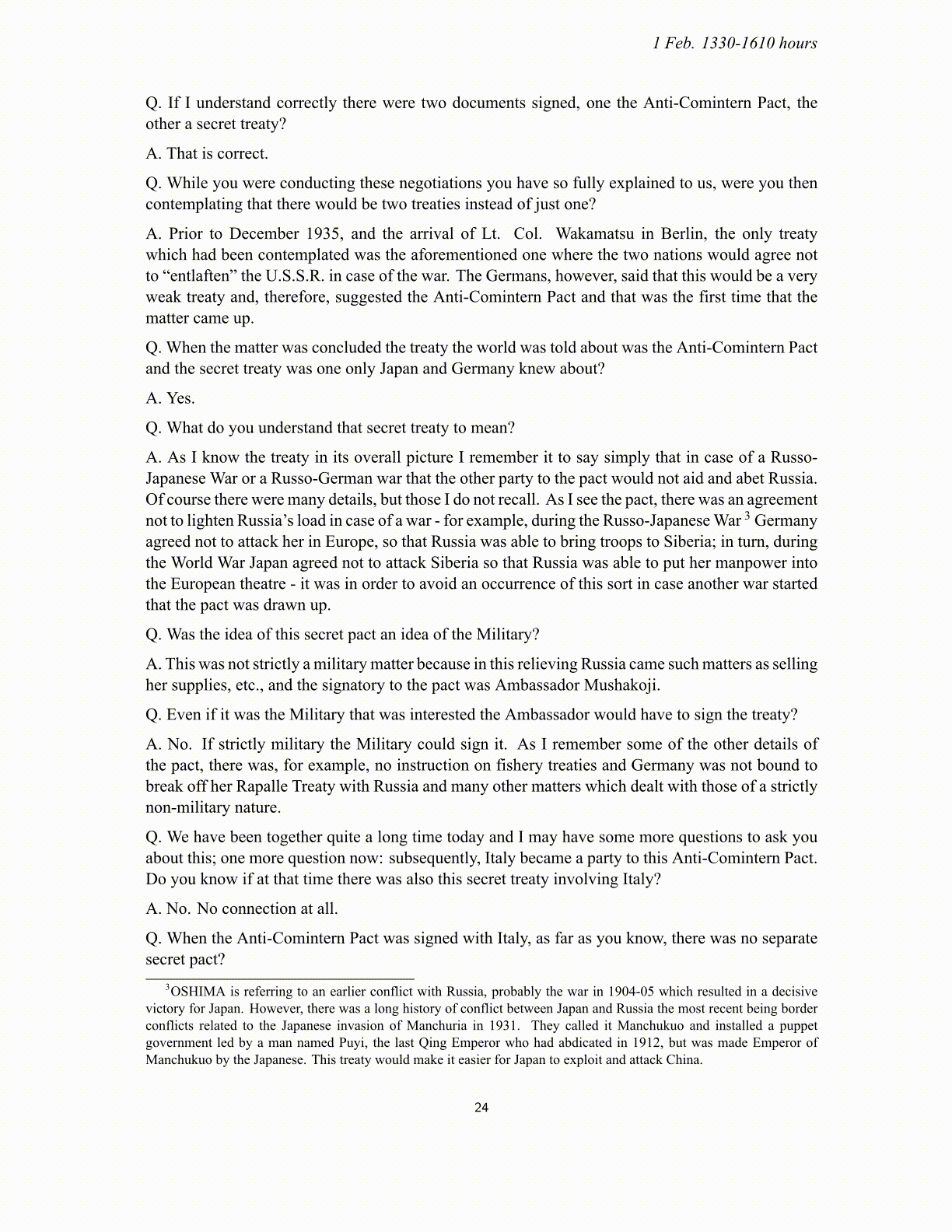
1 Feb. 1330-1610 hours Q. If I understand correctly there were two documents signed, one the Anti-Comintern Pact, the other a secret treaty? A. That is correct. Q. While you were conducting these negotiations you have so fully explained to us, were you then contemplating that there would be two treaties instead of just one? A. Prior to December 1935, and the arrival of Lt. Col. Wakamatsu in Berlin, the only treaty which had been contemplated was the aforementioned one where the two nations would agree not to “entlaften” the U.S.S.R. in case of the war. The Germans, however, said that this would be a very weak treaty and, therefore, suggested the Anti-Comintern Pact and that was the first time that the matter came up. Q. When the matter was concluded the treaty the world was told about was the Anti-Comintern Pact and the secret treaty was one only Japan and Germany knew about? A. Yes. Q. What do you understand that secret treaty to mean? A. As I know the treaty in its overall picture I remember it to say simply that in case of a Russo- Japanese War or a Russo-German war that the other party to the pact would not aid and abet Russia. Of course there were many details, but those I do not recall. As I see the pact, there was an agreement not to lighten Russia’s load in case of a war - for example, during the Russo-Japanese War 3 Germany agreed not to attack her in Europe, so that Russia was able to bring troops to Siberia; in turn, during the World War Japan agreed not to attack Siberia so that Russia was able to put her manpower into the European theatre - it was in order to avoid an occurrence of this sort in case another war started that the pact was drawn up. Q. Was the idea of this secret pact an idea of the Military? A. This was not strictly a military matter because in this relieving Russia came such matters as selling her supplies, etc., and the signatory to the pact was Ambassador Mushakoji. Q. Even if it was the Military that was interested the Ambassador would have to sign the treaty? A. No. If strictly military the Military could sign it. As I remember some of the other details of the pact, there was, for example, no instruction on fishery treaties and Germany was not bound to break off her Rapalle Treaty with Russia and many other matters which dealt with those of a strictly non-military nature. Q. We have been together quite a long time today and I may have some more questions to ask you about this; one more question now: subsequently, Italy became a party to this Anti-Comintern Pact. Do you know if at that time there was also this secret treaty involving Italy? A. No. No connection at all. Q. When the Anti-Comintern Pact was signed with Italy, as far as you know, there was no separate secret pact? 3 OSHIMA is referring to an earlier conflict with Russia, probably the war in 1904-05 which resulted in a decisive victory for Japan. However, there was a long history of conflict between Japan and Russia the most recent being border conflicts related to the Japanese invasion of Manchuria in 1931. They called it Manchukuo and installed a puppet government led by a man named Puyi, the last Qing Emperor who had abdicated in 1912, but was made Emperor of Manchukuo by the Japanese. This treaty would make it easier for Japan to exploit and attack China. 24